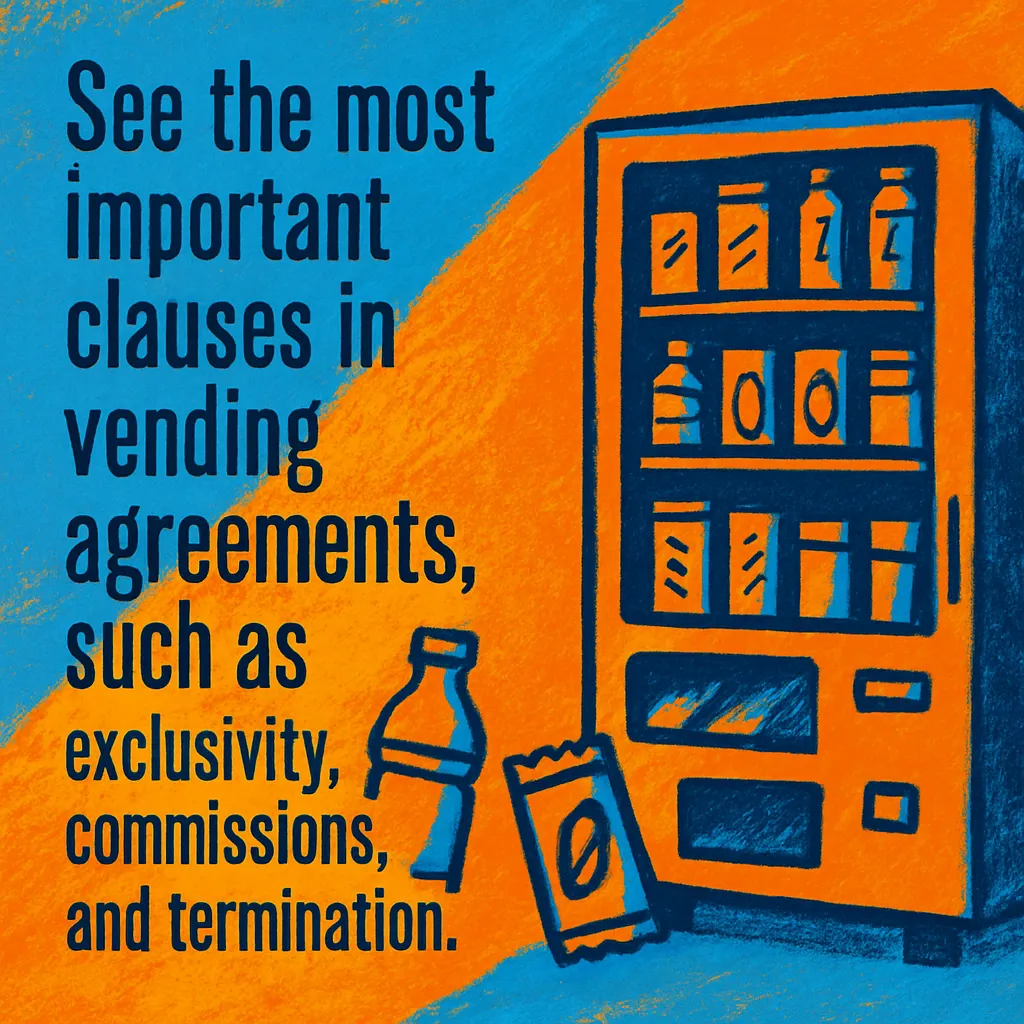Common Clauses in Vending Contracts
See the most important clauses in vending agreements, such as exclusivity, commissions, and termination.
Back to Vending Contracts ResourcesSee the most important clauses in vending agreements, such as exclusivity, commissions, and termination.
Back to Vending Contracts ResourcesA clear vending contract is essential for a successful partnership. It outlines expectations, responsibilities, and benefits for both the vending service provider and the location owner, ensuring smooth operations and transparent dealings.
![]() Clarity on revenue sharing and commission rates
Clarity on revenue sharing and commission rates
![]() Defined terms for service, maintenance, and product stocking
Defined terms for service, maintenance, and product stocking
![]() Protection for both parties regarding liability and termination
Protection for both parties regarding liability and termination

Entering into a vending contract can be straightforward when you understand the fundamental clauses that protect both your interests and those of your vending service provider. These agreements define the operational framework, financial arrangements, and mutual obligations, ensuring a mutually beneficial relationship. For a deeper dive into the overall structure of such agreements, refer to our guide on how vending contracts work.
An exclusivity clause is a common, yet critical, component of many vending contracts. It grants the vending provider the sole right to install and operate vending machines within a specific location, facility, or property. This means no other vending company can place machines in the designated area. While beneficial for the provider by securing their investment, locations should carefully consider the scope of exclusivity to ensure it aligns with future plans for amenities. Understanding vending location exclusivity is crucial before signing.
One of the primary benefits for a location hosting vending machines is the potential for revenue generated through commissions. The contract's commission rate clause details the percentage of sales revenue the location owner will receive. This rate can vary significantly based on location type, machine sales volume, and the products offered. Clear terms here prevent disputes and establish a predictable income stream. More details on financial aspects can be found in our article on commissions in vending contracts.
The "Term of Agreement" clause specifies the duration of the contract, typically ranging from one to several years, often with options for renewal. Equally important is the "Termination Clause," which outlines the conditions under which either party can end the agreement early. This includes notice periods, reasons for termination (e.g., breach of contract, poor performance), and procedures for machine removal or final settlements. Carefully reviewing these terms provides crucial flexibility and protection for both parties. For related insights, see how service level agreements define expectations.
This section delineates who is responsible for what. Typically, the vending provider handles machine installation, stocking, maintenance, cleaning, and repairs. However, the location owner usually provides necessary utilities like electricity and ensures clear access for servicing. A well-drafted contract clearly defines these duties to avoid operational misunderstandings. Examples of operational details can be seen in discussions about who fills and restocks vending machines and the installation process.
An indemnification clause protects both parties from legal liabilities arising from the vending operation. For instance, if a customer is injured by a faulty machine, this clause would clarify who bears the responsibility. The contract should also specify insurance requirements, ensuring both the vending provider and the location owner have adequate coverage (e.g., general liability insurance) to mitigate risks. Understanding these clauses helps safeguard against unforeseen circumstances, much like detailed terms protect both parties when dealing with vending management companies, as discussed in contract terms with vending management companies.
An exclusivity clause grants a single vending service provider the sole right to operate vending machines within a specified location or on a property, preventing other vendors from setting up competing machines.
Commission rates determine the percentage of sales revenue that the location owner receives from the vending machine's operation. It's a key factor in the financial benefit for the property.
A strong termination clause should outline conditions for early termination, required notice periods, and any penalties or procedures for equipment removal or final payments.
The term of agreement specifies the duration for which the contract is valid, whether it’s a fixed period or renewable, and helps both parties plan their vending operations long-term.
Defining product selection ensures the vending machine is stocked with items appropriate for the location's clientele, whether aiming for healthy options, popular snacks, or specific brands.
The contract clarifies who is responsible for machine installation, maintenance, stocking, repairs, and providing utilities (like electricity), avoiding future disputes.
A service level agreement (often part of the contract) sets out the expected quality of service, including restocking frequency, repair response times, and cleanliness standards for the machines.
An indemnification clause protects both the vendor and the location owner from liabilities, damages, or costs that may arise from the vending operation, like accidents or property damage.
Yes, it should specify accepted payment methods (cash, card, mobile) and outline who is responsible for payment processing fees and security related to transactions.
A 'right of first refusal' clause typically gives the current vending provider the first opportunity to match any competing offers for vending services when the contract term ends, ensuring continuity.